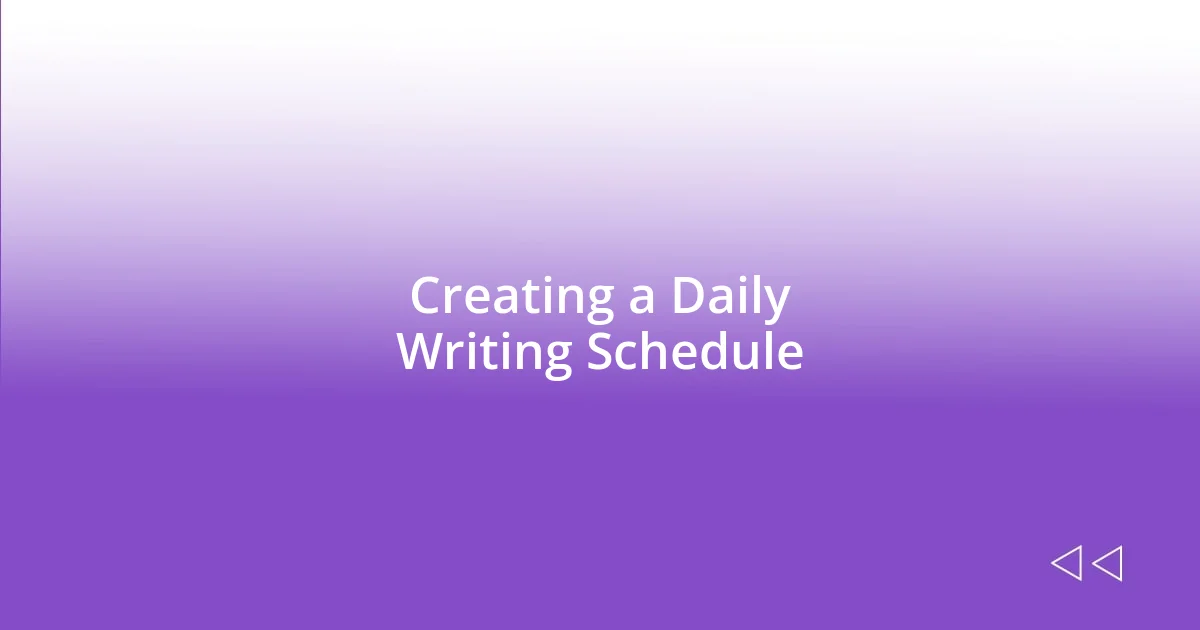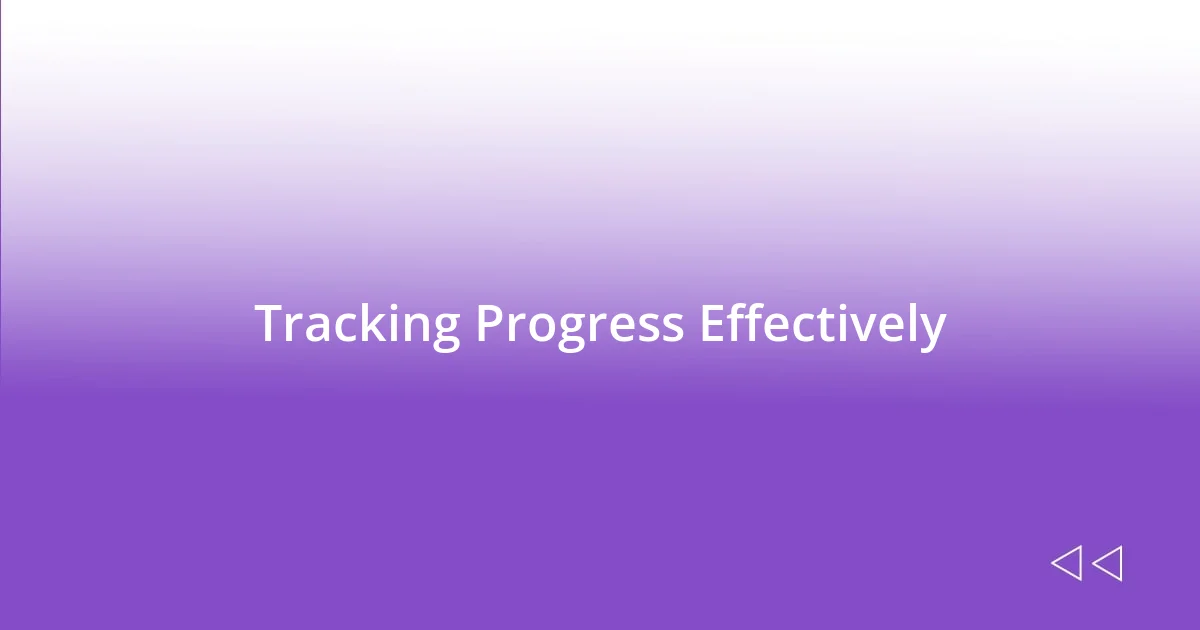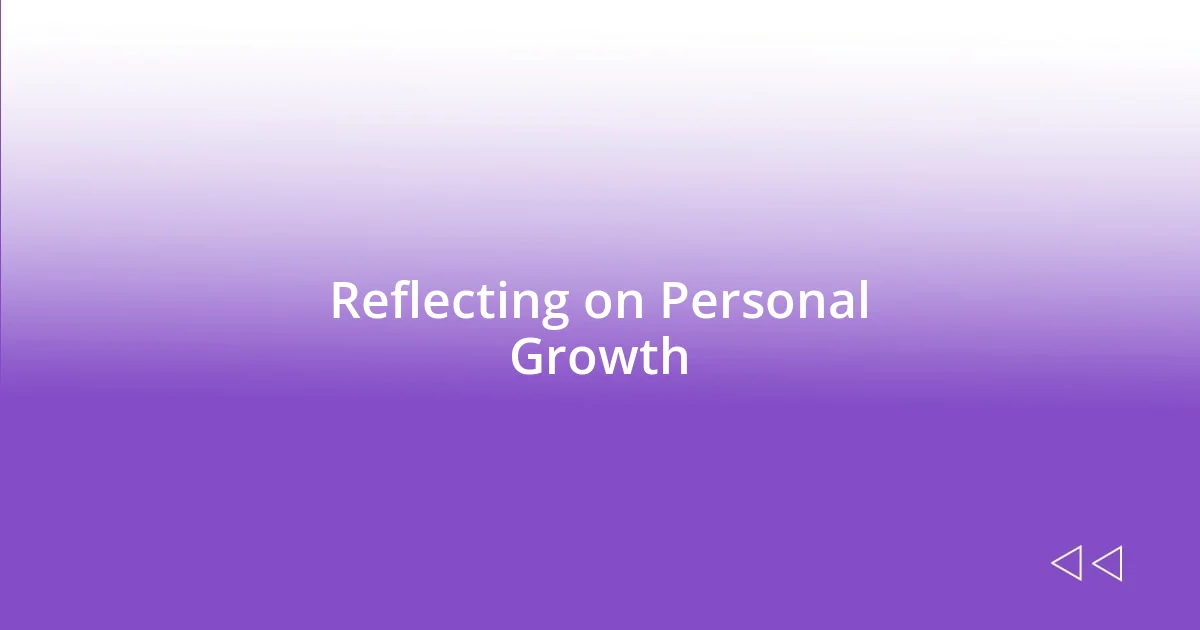Key takeaways:
- Finding a balance between page count goals and writing quality is essential for maintaining creativity and passion.
- Creating a flexible daily schedule tailored to personal rhythms enhances productivity and the overall writing experience.
- Reflecting on emotional responses to page count goals can lead to improved motivation and a more fulfilling writing journey.

Understanding Page Count Goals
Page count goals can be a powerful motivator for writers, shaping our daily routines and focusing our creativity. I remember the first time I set a page count for a project; it felt like a game—how many pages could I produce in a day? It was exhilarating! But, as I quickly learned, it’s important to balance quantity with quality.
Have you ever felt the pressure of reaching that magic number? It can be exhilarating, yet daunting. I once found myself racing against the clock, pushing through the words without much thought to their depth. It made me realize that while hitting those page counts can be exciting, the true joy in writing often comes from crafting each sentence with care, rather than simply meeting a numerical target.
On a deeper note, page count goals sometimes reflect our inner need for accomplishment. When I achieved my first major page milestone, a wave of pride washed over me. But I also started questioning: Am I writing just to meet a goal, or am I writing to share something meaningful? This conflict sparked a transformation, leading me to embrace goals not just as benchmarks, but as a stepping stone towards telling the stories that truly resonate with me.

Setting Realistic Writing Targets
Setting realistic writing targets is crucial for maintaining motivation and ensuring creativity flows smoothly. Early on in my writing journey, I set ambitious goals, aiming for twenty pages a day. While I achieved these numbers, burnout followed swiftly. I learned that it’s better to set achievable daily targets that allow me to maintain my pace without compromising my well-being or the quality of my work.
Here are some practical tips I’ve found helpful when establishing my writing targets:
- Assess Your Writing Speed: Understand how many pages you can realistically create in a given time frame.
- Incorporate Flexibility: Life happens! Having a buffer in your goals can help you accommodate unexpected challenges without stress.
- Celebrate Small Wins: Reward yourself for reaching small milestones; it keeps your spirits high.
- Focus on Content Quality: Shift your mindset from quantity to the impact you want your writing to have, ensuring you’re engaging your audience meaningfully.
By taking these steps, I’ve turned writing into a more fulfilling and manageable practice rather than a pressure-filled race against the clock.

Creating a Daily Writing Schedule
Creating a daily writing schedule can significantly enhance your productivity and creativity. I’ve found that blocking out specific time slots for writing makes it feel less like a chore and more like a dedicated craft. Early mornings have become my golden hours; the world is quieter, and my thoughts flow seamlessly when I can focus without distraction. Have you ever tried writing at a time when you feel most inspired? It’s a game-changer.
Another fantastic strategy is to tailor your schedule around your personal rhythms. For instance, I realized that I often hit a creative slump in the afternoon. By acknowledging my natural ebbs and flows, I adjusted my writing hours to maximize my peak performance times. This simple shift made a notable difference in the quality of my output. Imagine how much more rewarding your writing could be if you align it with your body’s natural tendencies!
Sometimes, life throws curveballs that can derail even the best-laid plans. When I started incorporating reflection time into my schedule at the end of the day, my writing became enriched with new insights. I’d look back at what I accomplished and assess what worked and what didn’t. This process not only solidified my commitment but also deepened my passion for my projects. It’s incredible how a little reflection can elevate your writing experience!
| Schedule Type | Benefits |
|---|---|
| Fixed Schedule | Consistency promotes discipline and helps build a writing habit. |
| Flexible Schedule | Accommodates life changes and personal energy levels, reducing stress. |
| Reflective Time | Encourages growth and insight, enhancing the quality of future writing. |

Tracking Progress Effectively
Tracking progress is an essential part of any writing journey. Personally, I’ve found that maintaining a simple tracker, whether it’s a checklist or an app, can serve as a daily motivator. Every time I check off a completed task, I feel a small rush of accomplishment. Isn’t it amazing how something so simple can bring a bit of joy to your day?
Another effective method I’ve adopted is keeping a journal of my writing journey. I jot down not just the pages written, but also how I felt during that time. It’s fascinating to look back and see how my mood affected my productivity. Were there days when I breezed through pages effortlessly, only to hit a wall the next? This reflection helps me understand my patterns and adjust my goals accordingly.
Lastly, I’ve learned the value of sharing my progress with a writing buddy. Having someone to exchange updates with creates a sense of accountability. There are moments when I feel too tired to write, but knowing that someone else is rooting for me makes all the difference. Have you ever thought about how a little accountability can turn your writing routine into a collaborative adventure? It’s empowering!

Overcoming Writer’s Block
Overcoming writer’s block can feel like an insurmountable challenge at times. I remember moments when staring at a blank screen made me feel paralyzed. It was discouraging, but I discovered that embracing short writing sprints can be incredibly liberating. Setting a timer for just 10 minutes allowed me to push past the mental fog and often led to a surprising flow of ideas. Have you tried just letting go for a few minutes? You might just stumble upon something rich and unexpected.
Another strategy I’ve found helpful is shifting my environment. Early on, I noticed how a change of scenery could reignite my creativity. A local coffee shop or a quiet park bench became my refuge during those stifling moments of writer’s block. There’s something about a fresh setting and the hum of life around me that fuels inspiration. Have you thought about how a simple change in location might transform your mindset?
I also learned to be kinder to myself during these tough patches. There were days when I felt utterly stuck, and instead of berating myself, I took a walk or engaged in another creative outlet, like drawing or doodling. It turns out, stepping away often paved the way for fresh ideas. Isn’t it interesting how we can find inspiration in the simplest of activities? Embracing these moments of leisure allowed my mind to reset and return to writing with renewed enthusiasm.

Evaluating Your Page Count Strategy
When evaluating your page count strategy, it’s important to revisit the goals you set initially. I once aimed for 1,000 words a day without considering my energy levels or personal commitments. It didn’t take long to realize that this ambitious target cast a shadow over my writing, making it feel more like a chore than a passion. Could it be that reevaluating your targets might help you rediscover the joy in your writing?
Another perspective I found enlightening is assessing the quality of what I produce alongside the quantity. Sometimes, I get caught up in hitting that magic number, but I’ve learned that producing even a few well-crafted paragraphs can be far more satisfying. The other day, I spent an afternoon refining just three pages, and the feeling of creating something meaningful felt much more rewarding than cranking out ten mediocre ones. Have you ever found yourself prioritizing quality over quantity and felt the difference it makes?
Finally, I highly recommend reflecting on your emotional response to your page count goals. I vividly recall days bursting with creativity when I’d hit my target early and danced through my writing. Yet, other days left me drained and frustrated. This contrast taught me that flexibility is key. Adjusting my expectations based on how I felt helped transform my writing routine into something more attuned to my personal rhythm. How do you think staying in tune with your emotions could enhance your writing experience?

Reflecting on Personal Growth
Reflecting on my personal growth has often led me to consider how my writing journey has shaped me as an individual. I can trace back to the days when hitting a certain page count felt like a badge of honor, yet I was losing touch with the very essence of why I write. It’s fascinating how those initial pressures transformed into a deeper understanding of my own creativity. Have you ever noticed how growth sometimes means unlearning what we thought we needed?
One memorable moment was when I decided to set aside my page count altogether for a week. Instead of fixating on numbers, I focused on simply enjoying the act of writing. That week I discovered new styles and topics that I’d never dared to explore before. It was like rediscovering a forgotten passion, and I felt a weight lift off my shoulders. Can you remember a time when you let go of expectations and found something beautiful within yourself?
Over the years, I’ve learned that my relationship with writing mirrors my personal evolution. As I’ve grown, so too have my motivations and desires. I’ve come to understand that each piece I create doesn’t just reflect my skills; it captures my journey, struggles, and triumphs. Each keystroke tells a story of resilience and passion. Isn’t it amazing how writing can serve as a mirror, reflecting the growth that sometimes feels hard to recognize?












